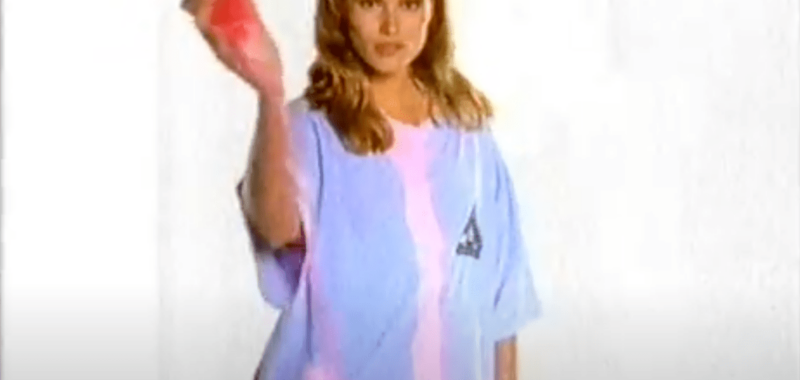
Hypercolor Courtesy of YouTube/Jeans West Hypercolor
What could possibly be more attractive than your clothes changing color every time you worked up a sweat? That was the hot look — literally — for millions of kids and teenagers in 1991, when Hypercolor t-shirts were officially all the rage — but it was way less fun than it looked on the TV commercials.
It was the era of Bart Simpson releasing music, MC Hammer rocking big pants and everyone embracing some very eye-catching fashion. The bright, brash color palette of the ‘80s dangerously intersected with some deranged futuristic ideas as we all got over-excited about the approach of the 21st century — at least, until grunge took hold and excitement became uncool.
Hypercolor launched to much, well, hype in 1991, selling $50 million of color-changing swag globally (in fact, they were actually known as “Global Hypercolor” outside of the US), before promptly going bankrupt the following year because they couldn’t keep up with demand for their revolutionary color-changing garments. Yep, we sure snapped those ridiculous things up. What was that all about?
For a year or two, the t-shirts, which used (here’s the science bit!) Thermochromic dye to transform in response to temperature changes, were a must-have for the generation who are now re-watching Gilmore Girls for the fourth time, googling perimenopause symptoms and mindlessly reposting false information about Instagram data breaches.
The brand did release a few other items too, like Hypercolor shorts and baseball caps, but really it was all about the tee (not least because who wants a color-changing crotch?). In theory, the idea of wearing a garment that transforms before your very eyes is revolutionary. Who wouldn’t want their clothes to reflect the changing weather conditions, or the fact that somebody with a clammy palm had just slapped you on the back?
The trouble was, if you were prone to sweaty pits or the dreaded back-drip, it wasn’t a very flattering look at all. And there were a lot of things that could make you sweat in 1991. Your teacher openly gushing over your essay on The Scarlet Letter in front of your crush. Your mom calling you by your full name, instead of your nickname, in front of friends. Joey McIntyre suddenly gazing into the camera as you watched music videos with your dad in the same room. Yes, life was reliably mortifying, and your Hypercolor tee (the pink and purple one, natch) only served to highlight every last embarrassing moment for all to see and giggle at.
Until it didn’t. Because after a few washes, that fabulous pink and purple colorway turned disappointingly brown. Nobody has the patience to hand-wash a t-shirt, so after a while, the technology couldn’t cope with the heat of the water, and you were left with a sad, ugly, useless rag.
For a (hot) minute there, however, it felt like Hypercolor was the ultimate blend of style and science. It just so happened that the science was more middle-school chemistry project than Vogue cover. But if you’re somehow feeling nostalgic for that bizarre and mercifully brief moment in fashion history when our clothes were determined to expose us for the hot messes we were, a quick online search can reunite you with one on your preloved marketplace of choice.
Will it still work? We have no idea. But if it does, you could be one hot flash or fit of rage away from actually getting your own kids to glance up from YouTube for a second to marvel at the timelessly amazing color-changing technology before them.

